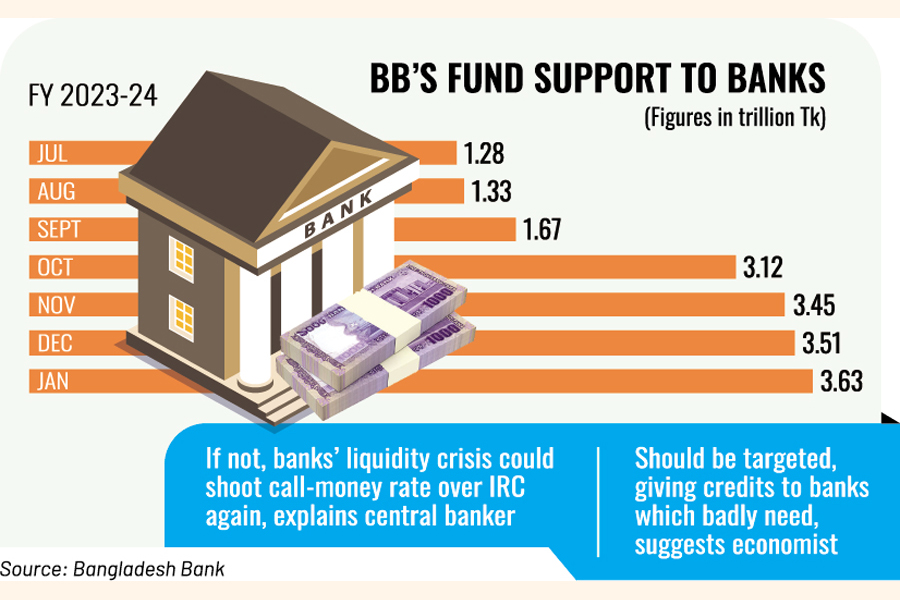
Published :
Updated :

Liquidity feeding into credit-hungry banks marks a significant rise amid major liquidity crunch facing the industry, officials say, notwithstanding the central bank's contractionary monetary stance.
As the buildup of pressure on the overall liquidity in the banking sector continues following the contractionary monetary stance taken by the Bangladesh Bank to combat inexorable inflation, sources at the BB have said, the commercial banks raise interest rates in their hunt for deposits. But the gradual increase in banks' deposit portfolios cannot alone help them navigate the existing liquidity tightness.
As a matter of fact, they explain, fund-requirement appeals from the commercial lenders to the banking regulator keep surging in recent times and the BB unrelentingly accepts those to ensure financial stability in the sector under such tightening monetary regime. This course is being followed to keep key fundamentals like money supply, private-sector credit and call-money rate in check.
According to BB statistics, the central bank provided liquidity supports amounting to Tk 633.47 billion in June 2023. The handouts more than doubled in a single month to Tk 1.28 trillion the following month.
The crescendo in lending to the banks goes on as the entire monthly volume of the liquidity supports built up to Tk 1.33 trillion in August, Tk 1.67 trillion in September and Tk 3.12 trillion in October.
The volume of cash funneled into the fund-starved banks further swelled to hit Tk 3.45 trillion in November, Tk 3.51 trillion in December and Tk 3.63 trillion in January 2024.
In the first 15 days of this February, the banks had received cash bailout amounting to around Tk 1.80 trillion from the central bank, according to the BB data.
The commercial banks can get financial support mainly to meet their SLR and CRR requirements from the central bank using short-term windows like REPO, liquidity supports, SLF (standing liquidity facility), assured repo and Islami Bank Liquidity Facility (IBLF).
Seeking anonymity, a BB official has said they have been receiving demands for increased volumes of fund from the scheduled banks in recent times against treasury bills and bonds.
"We are accepting all of their appeals considering the imperative of keeping financial stability in the banking sector in the current stress scenario," he said.
The central banker has observed that the banking industry is reeling from acute liquidity shortfalls because of growing purchase of the high-priced US dollar from the BB and supporting on a full scale government's domestic bank borrowing to make up for budgetary deficit.
"If we (the BB) don't continue cash feeding to the banks as per their requirements, the banks will be in severe liquidity crisis, which could take the call-money rate over the upper ceiling of IRC (interest rate corridor), like in the past, that we don't want," he says about the precautionary course of action against further overheating of the money market.
Later last month, the call-money rate overshot the upper ceiling of IRC to ramp up the interbank borrowing rate to as high as 9.60 per cent because of insatiate fund requirement of some banks.
Managing director and chief executive officer of Pubali Bank PLC Mohammad Ali says the commercial banks keep purchasing record amounts of US dollars from the BB-managed foreign-currencies reserves to meet their overseas payment obligations amid the ongoing forex dearth, which put pressure on the liquidity situation.
Simultaneously, he notes, the banks now have to meet government's entire bank borrowing requirement following the central bank's no-devolvement stance-meaning no more printing of money--which tightened the liquidity situation further.
"If the BB doesn't accept the liquidity-support requirement of the banks, the interest rate would go up to such a level which would be difficult for the economy to absorb," the experienced banker says as to how the authorities go on walking a tightrope in balancing economy and finance.
But economists raise alarm about its downside risk of further spikes in inflation as liquidity support to the commercial banks continues rising to a large extent.
Contacted for his view of the conundrum, Chairman of Policy Exchange of Bangladesh Dr M. Masrur Reaz said giving support to the banks facing difficulties to maintain regular banking operations amid liquidity dearth is understandable and logical in the current context.
"If the facility is indiscriminately given to all the banks, it is not desirable and may have contributed further to inflation that has already hit the common people badly," he added.
"It should be targeted, providing credit supports to the banks which badly need the assistance for stabilising their financial health," Mr Masrur suggests.
jubaire1980@gmail.com


 For all latest news, follow The Financial Express Google News channel.
For all latest news, follow The Financial Express Google News channel.